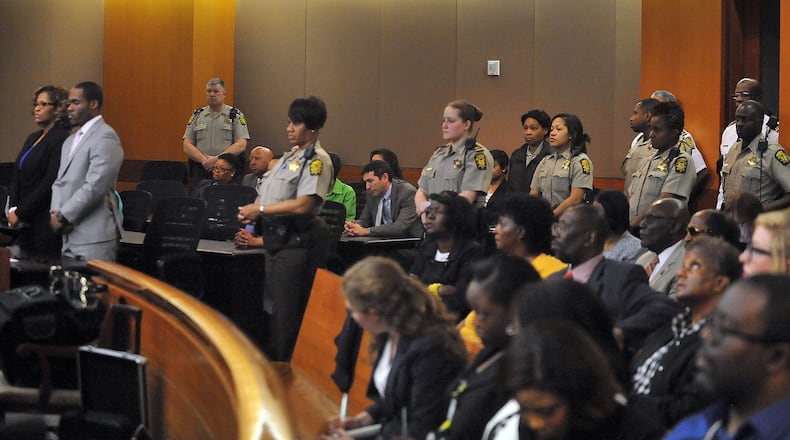A new round of appeals in the Atlanta Public Schools test-cheating case were argued Thursday before the Georgia Court of Appeals.
In one case, a lawyer for a former Dobbs Elementary School principal argued that her convictions should be overturned because prosecutors used her own — and coerced — statements against her. In another, a Fulton County public defender told the court he should not be required to represent all six of the remaining defendants because of conflicts of interest.
The appeals are before Chief Judge Christopher McFadden, Judge Brian Rickman and Senior Judge Herbert Phipps. Phipps did not attend the virtual arguments but will participate. He recently replaced Judge Christian Coomer on the panel because Coomer was suspended after judicial ethics charges were filed against him.
In all, 35 educators were indicted in a sweeping racketeering conspiracy case and also charged with other offenses, such as making false statements to investigators. Of those indicted, 21 pleaded guilty. Two others, including former Superintendent Beverly Hall, died before trial.
The remaining 12 educators went to trial on Aug. 11, 2014. Almost eight months later, on April 1, 2015, a jury found 11 of them guilty.
Two of those former educators, Tamara Cotman and Angela Williamson, have already exhausted their appeals and served their prison time. Two others later admitted their guilt in court and avoided prison.
Former Dobbs Elementary principal Dana Evans, whose appeal was argued Thursday, was found guilty of racketeering and making a false statement. She was sentenced as a first offender to five years, with one year to be served in custody. Her term was suspended pending her appeal.
Evans’ lawyer, Scott Key, focused his arguments on the 1967 U.S. Supreme Court ruling, Garrity v. New Jersey, which held that compelled statements given by government employees cannot be used against them in a criminal prosecution. In that case, police officers accused of fixing tickets gave coerced statements because they were told if they did not answer questions about the allegations, they could lose their jobs.
When the state commenced an investigation of the test-cheating scandal, then-Superintendent Hall sent an email to educators telling them they faced disciplinary action, including termination, if they did not cooperate, Key said.
“Her understanding was she was going to be fired if she didn’t participate,” Key said, referring to Evans.
When Evans sat for an interview, an agent asked her if she was aware of test cheating at Dobbs and if she participated in it. Evans said no, and that answer was used by prosecutors as an underlying offense to support the racketeering charge against her. They also used it to bring the false statement charge.
In pretrial hearings, Fulton County Superior Court Judge Jerry Baxter expressed serious concerns about possible Garrity violations and strongly indicated he was going to rule against the state. But Baxter ultimately surprised defense attorneys by finding no violations.
Fulton prosecutor Kevin Armstrong, arguing to uphold the convictions, said Baxter’s decision was well-founded.
“The Constitution does not protect lying,” he added. He also contended that a Garrity violation applies only when the person being questioned would be terminated automatically if he or she did not cooperate. In Evans’ case, he said, she was a tenured educator who was entitled to a hearing before she lost her job.
But Chief Judge McFadden said he was “highly skeptical” of some of Armstrong’s arguments. “We’re talking about a constitutional right here,” he said.
The other appeal was brought by public defender Steve Scarborough, who represents six former educators: Diane Buckner-Webb, Theresia Copeland, Sharon Davis-Williams, Tabeeka Jordan, Michael Pitts and Shani Robinson. He said they should be given separate counsel.
After reading the voluminous record, Scarborough said he realized he could not effectively represent his six clients’ individual interests. “That arrangement for representation is ethically untenable,” he said.
The court is expected to issue its rulings in the coming months.
About the Author
The Latest
Featured



